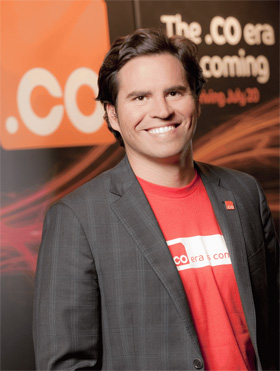|

In
1998 Calle discovered the Internet
while spending a winter in France
as an exchange student. |
Soon after he and his siblings
settled in Miami, Calle started his first real business
installing
car stereos from the garage of their home. He later
enrolled at the University of Miami to study
engineering but in 1998, while spending a year in France
as an exchange student, Calle discovered the Internet.
"France was cold in
the winter and I spent a good portion of my time reading the
news on the Internet – I’m a bit of a news freak,"
Calle confided. "Excite.com was big back then as
were Yahoo and AltaVista, but the reason I was
hooked is because I knew more about current events than my
friends and even family members back home. When I returned
to Miami in 1999 the internet bubble was in full
force and it became clear in my mind that I had to be a
part of it."
Within a year, at the age of 22,
Calle opened his first web-based company – a
search-advertising network (PPC) for Latin America
called TeRespondo, but things did not go quite the
way he planned. "Our first business plan was a huge
disaster," Calle said. "It was a hybrid
between GoTo.com
and AskJeeves |
| for Latin America. We
thought we would get
millions in funding, take the company public, and
drive Ferraris forever more. Not so. The
bubble burst
and our funding dried up." |
Calle said that taught him the first
of three key lessons he learned from that company - don’t
invest in a bubble.
"We fired ourselves
and our staff and shut down the company, but my co-founder
and I made the wise decision to keep the servers
running," Calle said. "Surprisingly, the
traffic on a meta-search engine that we built continued
to grow during all of 2001. Seeing that traffic growth,
we made the decision to give the company another try.
I dropped out of school and this time, with little money at
our disposal, we actually had to come up with a revenue
model and keep our expenses low. Our lack of resources is
what lead us to build a fully automated PPC platform
which over time, powered the paid search results on MSN
in Latin America, Terra, UOL, and a few other
large portals."
That was lesson number two:
Lack of money is good for start-ups. It allows
creativity to flourish.
"By March of 2002 Google
had entered the space and started a massive war
against GoTo.com (Overture.com) for world domination,"
Calle continued. "In an effort to survive, Yahoo
would then acquire Overture. However, Google doubled
its efforts, blasting lethal rockets in the form of guaranteed
payments and 100% (+) revenue share deals
to Yahoo/Overture distribution partners. It wasn’t long
before the archrivals saw Latin America as the next
frontier in their war and found TeRespondo to be a fast
way into the market. In early 2005 we decided to sell the
company in a deal
with Yahoo."
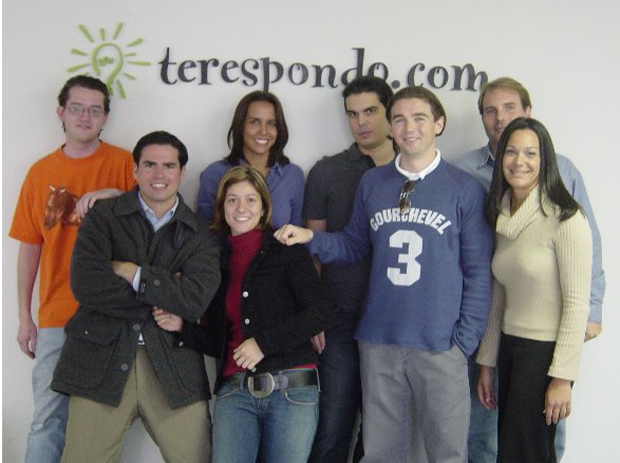
Juan
Calle (second from left) with his team at TeRespondo.com
"Sure, I would have liked to continue competing head
on against Google and Yahoo but the economics weren’t
there. Both of those companies were using their global
platforms to subsidize their entry into smaller markets - our
market," Calle said.
"That’s when I learned the third, and
possibly most valuable lesson to compete effectively
on the internet: build a global platform, and
make sure you scale it fast."
"Apart from those valuable lessons, along the way
I’ve made consistent efforts to surround myself with
really smart, self-driven individuals," Calle said.
"It starts with having a keen understanding of what
you’re not good at and making sure that the people
around you compensate for those weaknesses. But the key
component is letting them flourish - empowering
them. When you have a bunch of really smart people in one
room, the worst thing you can do is give them specific
instructions. I offer some guidance and the rest is
up to them."
|
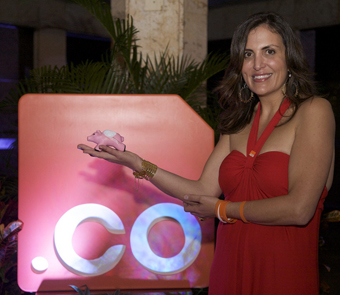
.CO
Director of Marketing Lori Anne Wardi,
one of the really smart people that Juan
Calle recruited for his .CO Registry team. |
After selling TeRespondo to Yahoo Calle went back to
business school and started contemplating his next career
move. "I had become interested in the domain world by
the end of 2004," Calle said. "At the time, a good
portion of the traffic growth at TeRespondo for our PPC ads
was coming from domain portfolios that needed to
monetize traffic originating from Latin America. Most of the
company’s attention was focused on monetizing the big
search engines so I didn’t really understand the concept
that well – all I knew is that our domain partners kept
growing and growing. So, once we sold the company I
started to look into it and saw it as a huge opportunity,
particularly on the development side."
"I started a new company, STRAAT Investments,
and began acquiring and developing .com travel
domains with exact match keywords like New
York
|
| Hotels and London
Hotels. Today those sites are part of FederatedTravel.com,
our online lead generator for travel
suppliers. It’s not a huge business yet, but
the margins and upside potential are enormous,"
Calle said.
|
Though they were separated for a time while waiting for
conditions in Colombia to stabilize, Calle's family
remained a huge part of his increasingly successful business
life. "Our family is very close knit and
business is a shared interest that we are all passionate
about," Calle said. "The advice of my father and
brother has been invaluable. While we all work in
different businesses and industries, every major decision is
shared. Our family has a pact to split every aspect
of our respective companies' successes (profits) or failures
(losses). The way we see it, one day I will be doing well,
and the next, it may be my younger sister who carries the
baton."
|
"As a family, I suppose we’ve learned from what
has happened in Colombia. Today, the country is doing extremely
well. It’s safer than ever and it’s
institutions and democracy are thriving. Foreign
direct investment is booming and the economy grew
even through the global recession," Calle noted.
Now, with .CO, Calle, his family and his homeland all
appear to be on the way to another major success. Calle told
us how he became involved in the re-birth of .CO.
"In 2006, a good friend and colleague in the
Internet world pointed me towards .CO," Calle said.
"Having already spent a few million dollars
acquiring premium travel domains, I understood that .com
was a scarce resource and that entrepreneurs and
businesses like mine would benefit from a new option
as long as it was global, credible, and recognizable. If
marketed properly, .CO was perfect in that context,"
Calle concluded.
"While I’m very proud of the fact that .CO is the
ccTLD assigned to the country
|
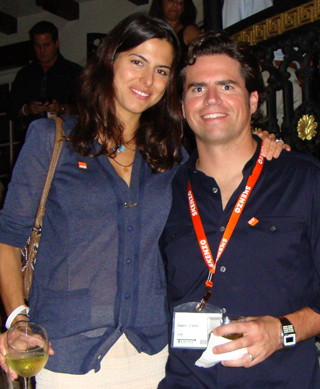
Juan
Calle and his wife Christina at the .CO
Gala Party at the Versace Mansion during
the
T.R.A.F.F.I.C. Miami conference in Oct. 2010 |
| Colombia, most people do
not know or care about that," Calle continued.
"The fact that it was of assigned to my country at some
point in history is largely irrelevant today from a marketing
standpoint. To prove this, prior to our launch we
enlisted PSB (a leading market research firm) to run
a study of 600 individuals in the U.S. who“had registered” or
“were planning to register” a web address.
Among other things, the survey asked them what .CO
meant: 80% thought it meant “company."
Only 3% said it meant Colombia," Calle
noted.
|
|
|

|
Colombia came to realize that there was huge potential
waiting to be tapped in their under utilized TLD. Calle
outlined the problems that had to be overcome.
"In
addition to having very strict registration
requirements, an ill-conceived effort to protect the
country’s identity on the Internet resulted in the
extension existing only in the third-level (for
example, .com.co) prior to our administration,"
Calle said. "It was also the reason why Colombia, the
30th largest economy in the world, with a population of 40
million, had only 28,000 .com.co domains
registered as of February 6th, 2010. There were 4
times more .coms registered by Colombians than
.com.co’s! If anything, the effort to protect
the country’s internet identity through restrictive
policy, was in fact killing it." Calle declared.
"During public forums between 2006 and 2008, the
government started to see this and realized that it needed a
new policy |
| and a new administration for the
country’s domain extension. Part of the change they saw
was that the new TLD process going on at ICANN would
make the distinction between gTLD’s and ccTLD’s a lot
less relevant," Calle said. |
"The conclusion from those forums was that Colombia
would have to relax its registration requirements in
a responsible and secure manner, if it wanted its domain
extension to survive. After a thoughtful procurement
process, which resulted in large international players bidding
for the administration rights, our company, .CO
Internet SAS, a joint-venture with Neustar
Inc., was awarded the contract to manage .CO
during the next decade."
|
"The benefits to the country are huge,"
Calle said. "The .CO extension is now sustainable long
term, it’s powered by world-class technology, it’s a new
source of revenue for the country, and it’s becoming part
of the fabric of the global Internet. In essence, Colombia
is now a player on the Internet."
That fact was underscored by ICANN's decision to
hold its 39th International Meeting in Cartagena,
Colombia Dec. 5-10, 2010. "The ICANN Meeting in
Cartagena was huge for the country and for .CO’s
marketing efforts," Calle affirmed."For me personally, addressing attendees
there was a symbolic
moment in my career."
"Part of the objective of the meeting was to
demonstrate that Colombia is embracing the Internet in a big
way. In
a video presentation to ICANN delegates,
Colombia’s President Juan Manuel Santos
|
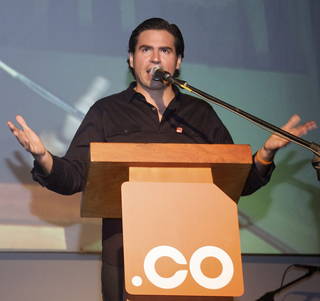
Juan
Calle
address delegates at the 39th International ICANN Meeting
(Dec. 2010)
|
| boldly
described a $2.8 billion dollar government initiative
called “Vive Digital” (translated in English to
mean “Live Digitally”) to help the country expand
its information and communications infrastructure and to
radically expand Internet use over the next four years - quadrupling
the number of Internet connections."
"Also at the ICANN meeting, Diego Molano Vega,
Colombia’s Minister of Information Technologies and
Communications, discussed how studies consistently show that
there is a direct correlation between Internet penetration,
technology use, job creation, and increased prosperity.
While Colombia’s level of technological development is
average for Latin American countries, the government
recognizes that the more technologically advanced Colombia
becomes, the more accelerated the pace of economic growth it
will enjoy," Calle said.
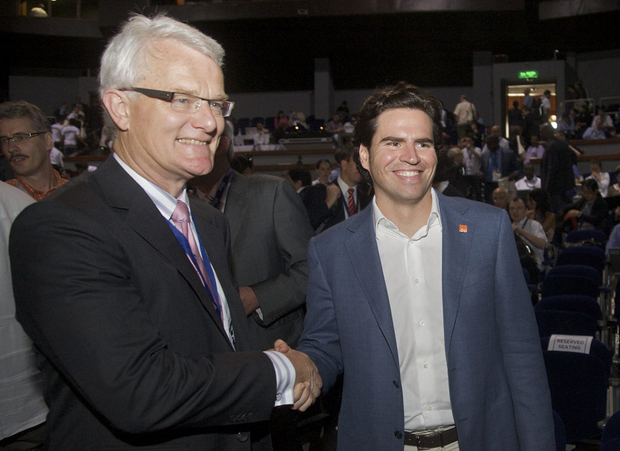
Juan
Diego Calle (right) greets ICANN Chairman
Peter Dengate Thrush at the
39th International ICANN Meeting in Cartagena,
Colombia in December 2010
|
As for his beloved .CO, even Calle has been pleasantly
surprised by how well things have gone. "That we are
now past 600,000 domains, at such an early stage is
definitely unexpected, particularly because of our pricing
strategy," Calle said in noting that .CO domains are
priced higher than most other TLDs. He added, "Even
more encouraging are the stats behind our registrant base:
- .CO has
registrants from over 200 countries.
- 90% of
registrants have purchased only 1 or 2 .CO domain names
each.
- 99% of
registrants have purchased 10 or less .CO domains each.
- Only 1% of all
registrants of .CO domain names have purchased 11 or more
names.
These numbers prove that we were successful in our
initial goal of allocating names among a very wide audience
while limiting massive speculation," Calle said.
"The other important metric – development (ie,
use) – is improving each day and we’ll be showcasing
more and more of those developed sites on Opportunity.co."
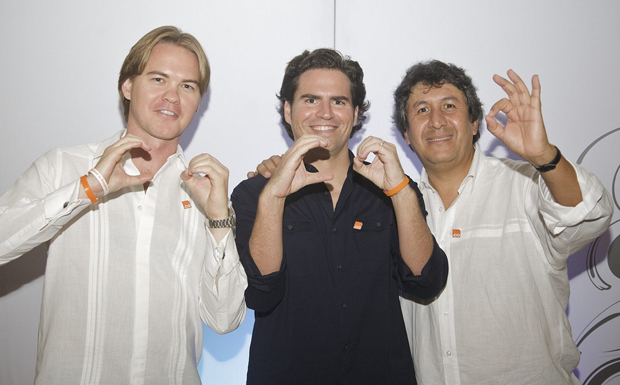
Leaders
of the .CO Registry team (left to right): COO Nicolai
Bezsonoff,
CEO Juan Diego Calle and VP & ccTLD Manager Eduardo
Santoyo
"Although this early success was unexpected, from day
1 we’ve had the vision of building a very large
business. It’s a 10 to 20 year business plan to
build a global platform for opportunity online. With that in
mind, I see our launch as a solid start; but we are part
of a marathon, not a sprint."
"Our 5-year goal is to be a significant portion of
the fabric of the Internet – with 3 to 5 million active
registrations. That may seem small relative to other
extensions, but we are focusing our marketing efforts (and
our pricing) to target real use – not
speculation,"
Calle said.
With that long term view Calle believes .CO can overcome
a challenge that other extensions have wilted under - that
is maintaining momentum after a fast break from the
gate.
"I
admit that it’s a big challenge, but we’ve
crafted our company's strategy with that in
mind. Let's dig deeper on that
subject:"
First, at the most fundamental level, we have a very
good product. Since before any of us were born, the
letters CO have been used as an acronym for “company”.
In the U.S., China, France, Argentina
and in just about every major country ”the letters
”CO” are used in that context within the real economy.
Also, in the virtual economy, over 40 ccTLDs use the
acronym to describe a commercial intent (.co.uk, .co.jp
and .co.kr are a few examples of this)."
Second, while the launch was successful, a very small
fraction of the population knows we exist.
Right now awareness of .CO is limited to the early adopters,
web entrepreneurs, technologists, and developers.
|
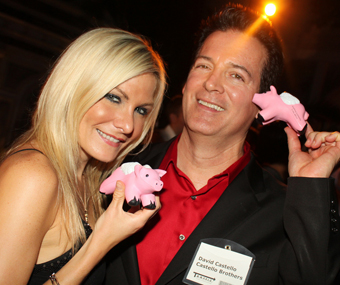
Natalie
Lambert and David Castello admire
the .CO Registry's "Anything is
Possible"
flying pig mascot during .CO's Versace
Mansion Party in Miami - October 2010) |
|
With those two things in mind, our job requirement is to
create awareness – massive awareness.
That’s where things like the Superbowl
ad with GoDaddy, Overstock
launching O.co internationally, the upcoming auction
of i.CO, and other fun things on the horizon
come into play. |
|
|
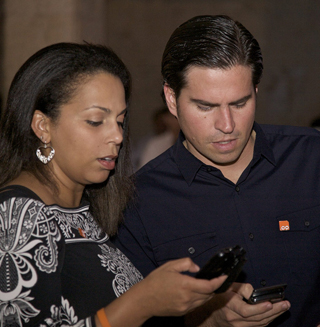
Calle
comparing notes with the .CO Registry's
Sr. Marketing Manager Crystal Peterson |
"The formula is simple: we create massive awareness.
People will “get it” because they’ve known about it
their whole lives. That creates growth, which in turn
creates use. Use creates more awareness, and the whole
thing becomes a self-fulfilling cycle," Calle said.
Calle, who will be talking more about this as a keynote
speaker at the Dot
NXT conference Feb. 10, 2011 in San
Francisco,
expanded on his team's three-pillar plaform (Awareness,
Growth and Use) noting "The marketing
tactics you have seen correspond to one or all three of
these pillars. For example, our deal with Twitter (T.CO)
corresponds to awareness and some use. We make a big
deal out of showcasing sites such as Angel.co,
Enter.co,and
Playbutton.co,
all of which corresponds to the tactics around inspiring and
demonstrating use. On the other hand, things such as GiveA.CO
and our registrar relationships
|
| correspond to growth.
But it’s the interaction of all three pillars that
gives us a very powerful strategy – a strong competitive
advantage. In that interaction lies the secret sauce. |
|
|
Still, this is a business that changes rapidly and
another big change is on the horizon - ICANN's plan to roll
out an unlimited number of new gTLDs. That is
expected to create a more competitive marketplace,
especially for current new extensions that already have
their hands full trying to make a dent in .com's dominance. "You might think that
as the administrator of one of the most promising upstarts
Calle would like more time to establish .CO but that is not
the case.
"In my mind it’s quite simple," Calle said.
"In today’s world, there is absolutely no valid
reason to limit the number of new TLDs, other than to
protect established monopolies. Let the market decide.
Sure, we will have a much harder time competing against all
the new options but I’m confident we will do so
effectively. In fact, new TLDs will help us educate
consumers that there is something different to .com, making
.CO even more credible to the end user," Calle
concluded.
|
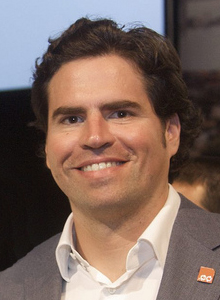
|
|



